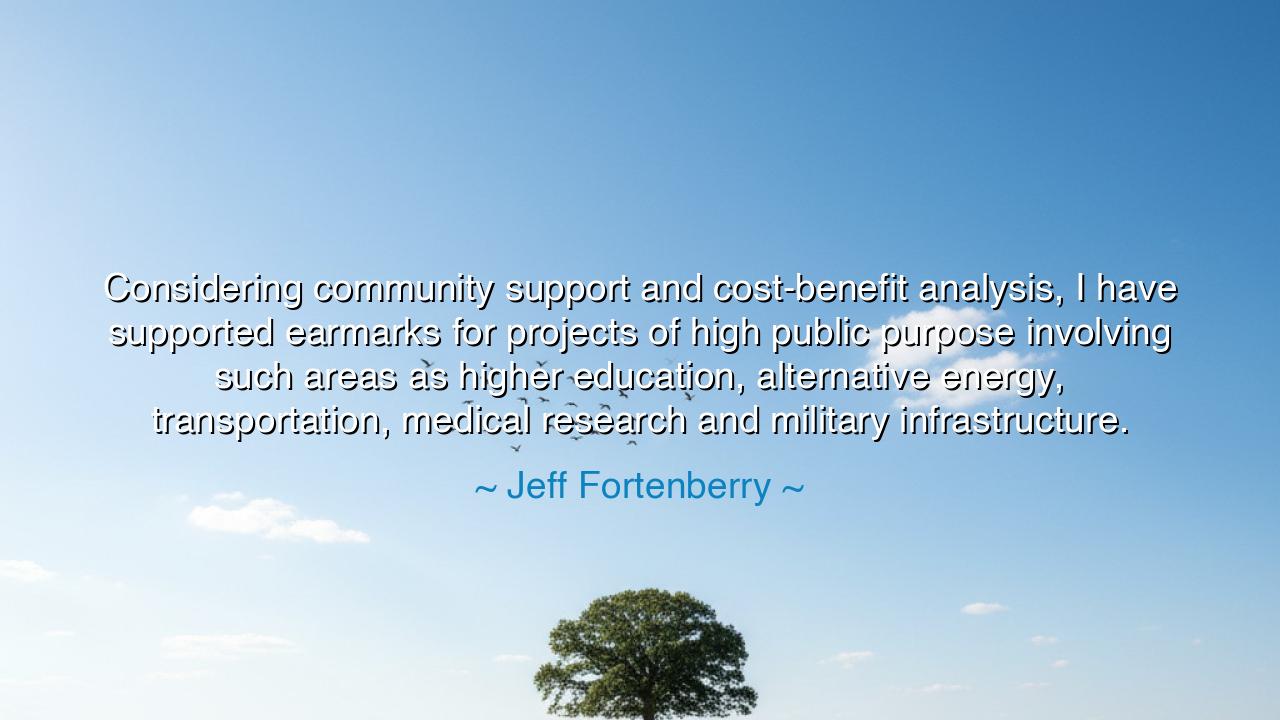
Considering community support and cost-benefit analysis, I have
Considering community support and cost-benefit analysis, I have supported earmarks for projects of high public purpose involving such areas as higher education, alternative energy, transportation, medical research and military infrastructure.






The words of Jeff Fortenberry carry the measured weight of both reason and responsibility: “Considering community support and cost-benefit analysis, I have supported earmarks for projects of high public purpose involving such areas as higher education, alternative energy, transportation, medical research, and military infrastructure.” Though spoken in the tone of governance, these words hold the deeper spirit of stewardship—the ancient duty of a leader to serve not himself, but the greater good. In them we hear the echo of a timeless truth: that power is not for possession, but for purpose, and that the wise ruler builds not monuments to his name, but foundations for his people’s future.
Fortenberry’s quote arises from the realm of public service, where choices must be weighed between ideals and realities. The earmark, often debated and misunderstood, is here presented not as an indulgence of politics, but as an instrument of justice when guided by community support and cost-benefit analysis. In this, Fortenberry evokes the balance that all wise decision-makers must seek—the harmony between compassion and calculation, between heart and mind. For the leader who gives without thought of consequence brings ruin, and the one who calculates without heart brings despair. Thus, the truest governance lies where empathy meets reason, where each action serves not vanity, but public purpose.
When he speaks of higher education, alternative energy, transportation, medical research, and military infrastructure, Fortenberry names the pillars upon which a civilization stands. To invest in education is to light the flame of knowledge for generations yet unborn; to invest in energy is to guard the Earth and empower its people; to build roads and bridges is to connect hearts and commerce; to fund medical research is to wage war against suffering; and to strengthen infrastructure is to secure the peace bought with sacrifice. These are not mere expenditures—they are moral commitments, the acts by which a society defines its character.
In the ancient world, wise rulers understood this sacred duty. The Roman emperor Marcus Aurelius, philosopher and soldier, once wrote, “That which benefits the hive, benefits the bee.” He spent the empire’s treasury not on luxuries, but on roads, aqueducts, and education—works that nourished the many. His reign, though filled with hardship, endured in memory because he governed with purpose. So too does Fortenberry’s philosophy reflect this lineage: that resources must be directed toward the common good, where cost and benefit are not cold numbers, but measures of human flourishing.
Yet his words also carry warning, for every system of power is shadowed by temptation. The misuse of earmarks—to serve personal gain or favor—corrupts the very spirit of public service. Fortenberry’s call to cost-benefit analysis and community support is therefore not mere procedure; it is a moral safeguard. He reminds us that when governance loses its grounding in community, it drifts toward tyranny, and when it forgets accountability, it sinks into decay. Just as a farmer must tend both soil and seed, so must the leader tend both policy and people, ensuring that what is sown in public trust bears fruit in public welfare.
Consider the story of Florence Nightingale, who during the Crimean War transformed the chaos of military hospitals into sanctuaries of healing. She was not a politician, but her actions embodied cost-benefit wisdom in its purest form. She gathered data, measured outcomes, and used evidence to persuade governments to reform. Her balance of compassion and logic saved countless lives and redefined the field of medical research. In her, as in Fortenberry’s words, we see the power of reason guided by conscience—the fusion of knowledge and purpose that lifts humanity higher.
The lesson, then, is this: in all endeavors—whether in governance, community, or the affairs of the soul—seek balance. Let your heart burn for service, but let your mind weigh each decision with care. Be neither the dreamer who builds castles in the air, nor the cynic who builds nothing at all. True change is born of both vision and discipline. Support what uplifts others, measure what is just, and act with both courage and humility. For the measure of a society, and of every person within it, lies in how wisely we use what we are given for the good of all.
And so, my child of reason and duty, remember this: every resource, every talent, every moment of your life is an earmark—a grant from time itself. Spend it not on vanity, but on public purpose, on that which endures beyond you. Build knowledge as your forefathers built roads; invest your energy in what heals and connects; defend truth as you would defend your home. For when you live not for yourself but for the flourishing of others, you fulfill the ancient covenant of civilization—the promise that each generation will leave the world better than it found it.






AAdministratorAdministrator
Welcome, honored guests. Please leave a comment, we will respond soon